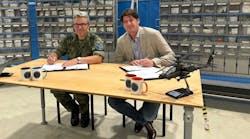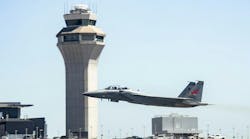Barnes Air National Guard Base Will Get F-35 Fighters, Ensuring Long-term Presence
WESTFIELD — The Air Force will base 18 of its $78 million, latest-generation F-35 fighters at the Air National Guard’s 104th Fighter Wing, guaranteeing the Westfield base’s role in the nation’s air defense and in the city’s economy for decades to come.
The Pentagon today designated the unit at Barnes-Westfield Regional Airport to receive a fleet of new F-35A Lightning II fighter jets. The announcement comes in the wake of a years-long lobbying effort by federal, state and municipal leaders to see the 104th receive upgraded aircraft. The average age of the existing fleet of F-15C Eagles is coming up on 40 years.
“This is perfectly aligning the 104th Fighter Wing with the mission of the Air Force beyond 2040,” said Brig. Gen. Virginia I. Gaglio, state commander of the Air Guard. “It ensures the viability of the 104th with the new national defense strategy and keeps us viable and relevant for many years in the future.”
The process that will clear the way for the jets’ arrival will be a lengthy, involving still more work on environmental review, additional site development work on the base and, ultimately, appropriations to fund the aircraft and training for pilots and maintenance teams.
The earliest that F-35s would land at Barnes, other than this spring’s air show when one of the jets will visit, might be during fiscal year 2026.
Over the past 18 months, former Gov. Charlie Baker, with support from U.S. Sen. Elizabeth Warren, D- Massachusetts, a member of the Senate Armed Services Committee, and U.S. Rep. Richard E. Neal, D- Springfield, ranking member of the House Ways & Means Committee, made repeated trips to the Pentagon to lobby the Bay State’s case for Barnes being designated for the F-35s.
“Today’s announcement that a new fleet of F-35A aircraft will be assigned to Barnes Air National Guard Base comes after years of advocacy,” Neal said in a statement.
Neal credited the Massachusetts congressional delegation, state leaders, the adjutant general for the state National Guard, Maj. Gen. Gary Keefe, and what he termed “the superb efforts of the dedicated servicemembers at Barnes.”
“Over the past several years, I have been in constant communication with Air Force leadership to underscore the importance of supplying Barnes with the resources needed to complete their critical missions,” Neal said. “I am glad that after years of ongoing discussions, those efforts have culminated in a positive outcome, one that will benefit the Western Massachusetts community for years to come.”
Warren and U.S. Sen. Edward J. Markey (D-Mass.) released the following statement regarding the Air Force’s decision: “Basing F-35s at Barnes is the right thing to do and good for the people of Massachusetts. This decision enhances our national security, positions the planes at a base more resilient against climate change, and will strengthen our regional economy.”
Baker pushed for the new planes both at the Pentagon and Capitol Hill in support of the 104th.
“I am very grateful to the Biden administration for choosing Barnes as the future site of its critical F-35 air wing,” Baker said in a statement. “I am also very grateful for the leadership of Gen. Gary Keefe and the entire Massachusetts National Guard for all you do for our residents and citizens here and abroad.”
“I’m thrilled that Massachusetts 104th Fighter Wing was selected by the U.S. Department of Defense to receive the F-35A fighter jets. This is great news for Barnes and Massachusetts,” Gov. Maura T. Healey said in a statement. “It will keep good jobs in Western Mass, create new jobs, and spur economic development. This is a testament to Massachusetts’ strong support for our military, our economic competitiveness, our unmatched education system and our bright future. I’m grateful for the hard work of Senator Warren, Chairman Neal and the Massachusetts congressional delegation as well as the Massachusetts National Guard to secure this result.”
“This decision validates the Wing’s exceptional performance,” said Air Force Col. David L. “Moon” Halasi-Kun, 104th commander. “We’ve provided air defense for 40 million Americans in New England and New York, a population that produces roughly 30% of the nation’s Gross Domestic Product, through the 24/7/365 no-fail Aerospace Control Alert mission, and our stellar performance was a big factor.”
Showing support
Westfield Mayor Michael McCabe said his city did all it could to show the Pentagon it backs the Air National Guard and was ready to welcome the new jets, a key factor for the defense department.
“It’s good for the city all the way around. It’s good for the national defense,” McCabe said. “I’m thrilled. The alternative to getting these planes would have been, potentially, to get nothing. And losing the 104th would have been tragic.”
The decision ensures Westfield and Barnes a place in the Air Force’s future and insulates it from potential base closures for the next 50 years, said Christopher J. Willenborg, airport manager.
The new planes won’t even begin arriving until 2026, Willenborg said Tuesday. But preparations have already been underway, in addition to the $4.5 million traffic entrance off routes 10 and 202 which will meet current ground security standards.
The 104th has 1,000 part-time traditional Guard members and approximately 500 full-time members.
Supporters say the decision will not only secure the Guard unit’s future but should also be a boon for the future of the municipal airport. Together, the airport and its tenants have an about $138.5 million payroll and a total economic impact of $236 million per year. The airport is responsible directly and indirectly for about 2,100 jobs, some 1,100 of which are at the Guard.
The military presence – both Air Guard and an Army National Guard helicopter unit – helps fund airport improvements and are a reason the FAA continues to staff the tower. Having a staffed tower, in turn, helps keep civilian employers like the Gulfstream corporate jet maintenance facility in Westfield.
The environmental review of the F-35 project is already in progress and is expected to be done in March 2024, Willenborg said. Residents turned out last August for an Air Force hearing on the noise associated with the F-35.
With the environmental review in hand, along with Tuesday’s decision to site the F-35s, the civilian airport authority can seek funding to do another “noise contour map” estimating loudness over the surrounding countryside.
That map allows the airport to pay for everything from noise mitigation, up to buying property and moving the people out, Willenborg said. But the emphasis in recent years has been on noise mitigation and sound dampening, like insulation and special windows.
McCabe, the city’s mayor, said noise shouldn’t be a problem, repeating the Air Force contention that while at full power, an F-35 is noisier than the planes now based at Barnes, but the F-35 is quieter because it doesn’t take off at full power, only at about 30%.
Risk of closing
Barnes was among three Guard bases across the country in contention for the assignment of either the F-35 or the latest incarnation of the Eagles, the F-15EX. The other bases are in Louisiana and California.
Throughout the process, supporters said they would be pleased to receive either aircraft, but the F-35 was clearly the goal of the efforts.
As recently as five years ago, some predicted the 104th might face closing if it did not receive an aircraft upgrade.
In the face of that, Keefe said Massachusetts stepped up to prevent that from happening. Beyond the lobbying effort, it involved the commitment of state funds to projects upgrading the base and the airport facilities and other measures to demonstrate Westfield would be a “welcoming community.”
“This decision is truly the result of a joint effort with the city leaders and local state legislators, the state administration and the Pentagon,” said Keefe. “Gov. Baker met with four different acting secretaries of the Air Force, two separate chiefs of staff. It’s an effort that was really led by Congressman Neal and Senator Warren. It is important not just across Massachusetts, but all across New England.”
Location is key
According to Keefe, Barnes is integral to the entire Northeast with its security. The 104th aircraft and pilots sit alert, 24/7, to respond to homeland security threats. That role would continue unabated as the base has the facilities to accommodate it, Keefe said.
In a more global view of national defense, Barnes’ location could play a meaningful role, making the F-35 decision vitally important, the general noted.
“The F-35 will allow the 104th more opportunities to get involved in some of the issues that the nation will be facing in the years ahead, in terms of our national defense strategy,” said Keefe.
“The beauty about Barnes is that while everyone is focused on the Pacific, with events in China and North Korea, this allows Barnes to keep an eye on events unfolding in Europe and Russia,” the general said. “The next hotly contested area will likely be the Arctic, and Barnes’ location allows us to be within six hours of getting aircraft to Europe.”
Years of improvements
The physical improvements at Barnes have played out over five years. Ground was broken last fall for a new $4.5 million traffic entrance off routes 10 and 202, near where the Army National Guard’s helicopter unit is now headquartered. The base is also the subject of a $4.7 million taxiway and aircraft ramp improvement project.
Next week, the Airport Authority goes out to bid on a $22 million to $23 million project to build a new, 75-foot-wide taxiway running the full length of and parallel to the airport’s main runway.
“It’s an important upgrade that we had planned on,” said Willenborg, the airport manager. “And it is also important for the F-35.”
“Airfield wise we are in pretty good shape.”
In addition, the Legislature in October passed and Baker signed into law the SPEED Act. The law makes it easier for military spouses to expedite the transfer of professional licenses if they move to Massachusetts because a spouse is transferred to a base in the state. That legislation was first filed in February 2021 by state Sen. John Velis, D- Westfield, and was at the time lauded as a key part of bolstering the state’s case for bringing the F-35s to Barnes.
“This new assignment of F-35A aircraft will also bring new transformative economic investments to our community and will benefit all of Western Massachusetts in the process,” said Velis. “This decision is a testament to all the work that has taken place over the last several years, specifically the passage of the SPEED Act and the state’s dedication to our military service members.”
Velis, himself a major in the Army Reserve, helped get the SPEED act passed last year. The law also smoothes the school registration process for children of military members relocating here and eases their ability to get in-state tuition at colleges and universities.
F-35s entered U.S. military service in 2011 with the Air Force and soon after the Marine Corps. The Navy received its first F-35s in 2013.
©2023 Advance Local Media LLC. Visit masslive.com. Distributed by Tribune Content Agency, LLC.


